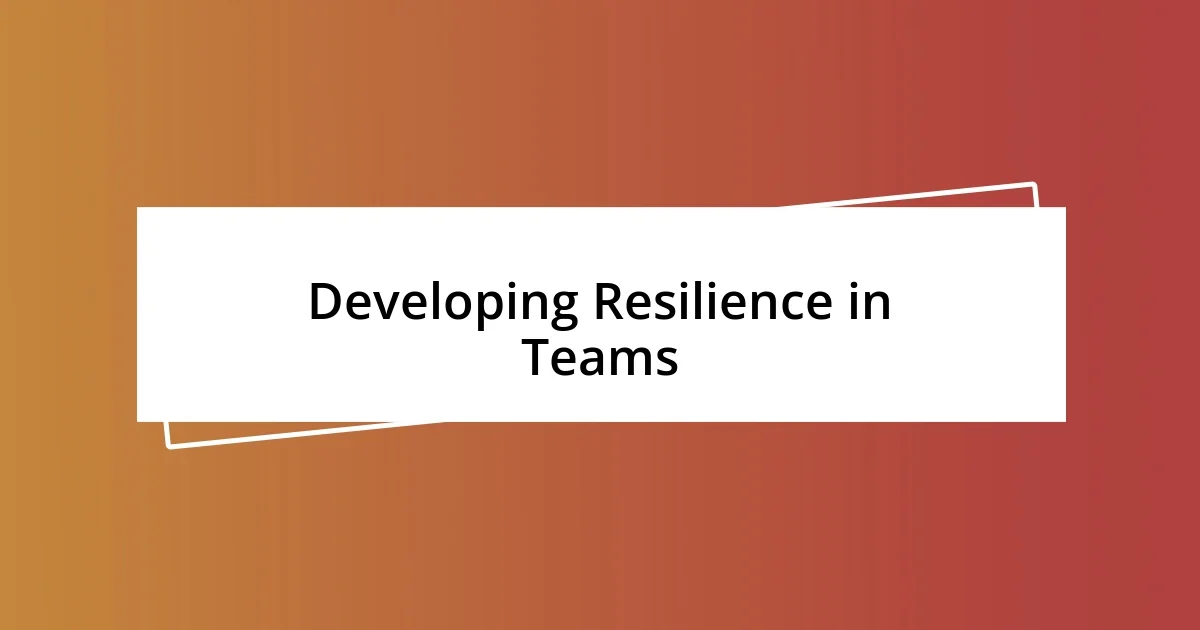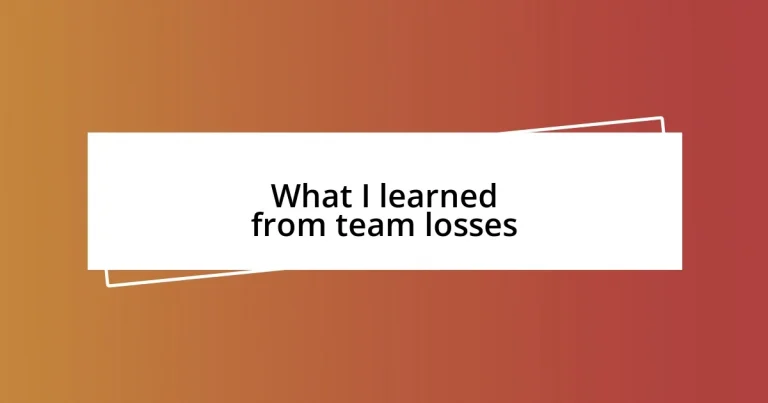Key takeaways:
- Losses serve as valuable learning experiences, fostering resilience and motivating personal and team growth.
- Effective communication and trust among teammates are essential for overcoming challenges and enhancing team dynamics.
- Celebrating small victories boosts morale and reinforces a positive team culture, helping maintain motivation despite setbacks.

Understanding the Impact of Losses
Losses can hit us hard, often leaving a bittersweet taste that lingers long after the game ends. I remember a particular match where we fell short, and instead of sharp anger, I felt this overwhelming sense of disappointment mixed with a desire to understand what went wrong. Isn’t it intriguing how losses can expose our vulnerabilities while also revealing opportunities for growth?
Every defeat carries lessons, if only we’re open to learning from them. After one game, our coach gathered us and pointed out the mistakes, but he balanced it with discussions about what we did well. It struck me that failures provide clarity; they outline what needs to change and remind us of why we’re doing this in the first place.
Reflecting on losses can become a powerful catalyst for self-improvement. I’ve found that taking time to analyze these experiences, rather than dwelling in negativity, transforms that pain into motivation. Have you ever considered how a loss could actually steer you toward a path of resilience? Sometimes, embracing these failures equips us with the strength to bounce back even stronger than before.

Reflecting on Team Dynamics
Reflecting on team dynamics after a loss uncovers layers of our interactions and collaborations that often go unnoticed. I recall a challenging game where our communication broke down completely. We had mismatched plays, and instead of a unified front, it felt like each player was operating in isolation. That experience taught me the invaluable lesson of trust and understanding among teammates. It made me realize how crucial it is to foster an open environment where everyone feels empowered to express their thoughts.
Here are some key points to consider about team dynamics during losses:
- Communication Breakdown: Often, losses reveal how key interactions can falter under pressure, emphasizing the need for clear dialogue.
- Trust Issues: A loss can expose cracks in trust that require addressing through team-building exercises or honest conversations.
- Role Clarity: Understanding each team member’s role becomes even more vital after a defeat, highlighting the importance of setting expectations.
- Emotional Support: After a setback, providing emotional backing to one another strengthens the team’s bond and encourages resilience.
- Diversity in Perspectives: Embracing different viewpoints can lead to innovative solutions and a deeper sense of camaraderie, especially in tough times.

Identifying Key Learning Moments
Identifying key learning moments is all about recognizing the nuances of our performance and mindset during tough losses. I remember one game vividly; we lost by a narrow margin, but it was a moment that transformed our approach to practice. It wasn’t the score but the realization that we had overlooked fundamental strategies that mattered. Reflecting on those moments broke down my assumption that we were already doing well; instead, it revealed gaps in our preparation.
Sometimes, learning emerges through collective reflection. I’ve witnessed a moment when a teammate shared how they felt overwhelmed during critical plays, which opened the floor for others to express similar concerns. Hearing those voices fostered unity and laid a foundation for improvement. It reminded me of the power of vulnerability; when we share our uncertainties, we enable growth that extends beyond the individual to the entire team.
In my experience, the hardest losses often become the most vital learning moments. I recall after a particularly crushing defeat where we all sat in silence, and oddly enough, it was that silence that pushed us to speak our truths. It turned into a deep discussion about personal responsibilities and team accountability. Those heartfelt conversations became stepping stones towards a stronger, more cohesive unit, proving that sometimes it’s through the raw emotions of losing that we uncover our greatest insights.
| Key Learning Moments | Impact on Team Dynamics |
|---|---|
| Realizing Strategy Gaps | Encourages detailed strategy discussions |
| Sharing Vulnerabilities | Fosters deeper connections and trust |
| Embracing Accountability | Strengthens collective responsibility |

Developing Resilience in Teams
Resilience in teams often flourishes in the wake of defeat. I’ve seen this firsthand when my team faced a series of losses that left us feeling defeated and disheartened. Instead of succumbing to negativity, we chose to lean on each other, discussing our feelings candidly during team meetings. This openness not only fostered emotional resilience but also ignited a sense of camaraderie that transformed our mindset.
Sometimes, it’s about how we adapt to setbacks. A moment that stands out to me was when we lost a crucial match due to a lack of preparation. Instead of casting blame, we gathered to seek solutions. We incorporated team-building exercises that not only improved our skills but also cultivated a supportive environment. This shift was so powerful that we learned to view challenges as opportunities rather than insurmountable obstacles.
The emotions swirling after a loss can act as a catalyst for growth. I vividly recall a match that shook our belief in our abilities. Yet, rather than shrink in response to that reality, we rallied together to craft a recovery plan that involved setting small, achievable goals. It was through this shared experience of vulnerability and determination that we developed an unwavering resilience — one that has stuck with me and our team today. How often do we overlook the strength we gain from simply standing together in tough times? I can tell you, that bond can drive a team to heights they never thought possible.

Strategies for Future Improvements
When considering strategies for future improvements, one key aspect I’ve found valuable is the importance of setting focused, short-term goals. After a particularly challenging season, my teammates and I sat down and devised small, attainable objectives. This approach transformed our training sessions and gave us something concrete to rally around. It’s amazing how a single goal can shift a team’s energy. Have you ever experienced a similar transformation just by focusing on one small change?
Additionally, embracing feedback is essential for growth. I remember a moment of honesty when a coach pointed out our recurring mistakes in matches, which initially stung but ultimately encouraged us to dive deeper into our performance analyses. This candid approach not only pointed out areas of improvement but also fostered a culture where constructive criticism was welcomed. How can we grow if we’re not open to facing the truth, right?
Lastly, I’ve found that celebrating small victories plays a crucial role in sustaining motivation. In one of our post-loss strategies, we chose to recognize individual and team achievements, no matter how minor. It’s incredible how shifting the focus to what we did right after a game can renew our spirit. Do you remember a time when acknowledging progress helped lift a team’s morale? It made us realize that every step forward, even after a setback, counts towards our bigger aspirations.

Fostering Open Communication
Fostering open communication is the lifeblood of any resilient team. I remember a soulful meeting we had after a particularly tough loss; the room was heavy with silence initially. But once one teammate began sharing their feelings about the game, others started to voice their thoughts as well. It turned into a cathartic moment, where we laid bare our frustrations and fears. In that space, we realized we all carried the same weight. Have you ever experienced the power of a shared vulnerability? It can create a profound bond.
One effective strategy I’ve found is to implement regular check-ins, providing a structured opportunity for everyone to share their perspectives. During one of our routine meetings, we introduced a simple practice of going around the room, allowing each team member to express one thing they felt went well and one area for improvement. This practice not only lessened the anxiety around sharing but also encouraged a culture of respect and growth. Does it surprise you to see how such a small gesture can reopen lines of communication? I can tell you it transformed our dynamic significantly.
In moments of defeat, clarity is key. I had the chance to be part of a roundtable discussion after we lost a critical game, and it stood out to me how those conversations opened doors for honest reflection. Rather than dwelling on who made mistakes, we shifted our focus to how we could support each other moving forward. By sharing actionable feedback, we learned together; it turned criticism into a collaborative exercise. Isn’t it interesting how the way we communicate can shape not just our responses, but our entire team culture? It’s in these moments that I’ve seen teams not just recover but thrive.

Celebrating Small Wins
In the midst of a losing streak, we began a new ritual—celebrating small wins. I remember after one tough match, rather than fixating on the score, we highlighted the plays that showcased teamwork and effort. It was a simple but powerful shift; suddenly, each player felt valued for their contributions, no matter the scoreboard. Have you ever noticed how acknowledging the little things can change the energy in a room?
One day, we clinched a minor victory—perfecting a drill we had struggled with in practice. The entire team erupted in cheers, and in that moment, I realized how celebrating these small milestones built our confidence. It reminded us that even when larger goals feel out of reach, progress is still worth recognizing. Isn’t it remarkable how a shift in focus can ignite a team’s spirit?
I’ve come to appreciate that these small celebrations foster a culture of resilience. After every challenging game, we made it a point to sit together and share one thing we were proud of, whether it was improving our communication on the court or simply showing up with determination. These moments of recognition lightened the atmosphere and created a sense of unity among us. Have you ever celebrated a small win that turned your perspective around? It’s astonishing how the simple act of acknowledgment can transform our motivation and mindset.














